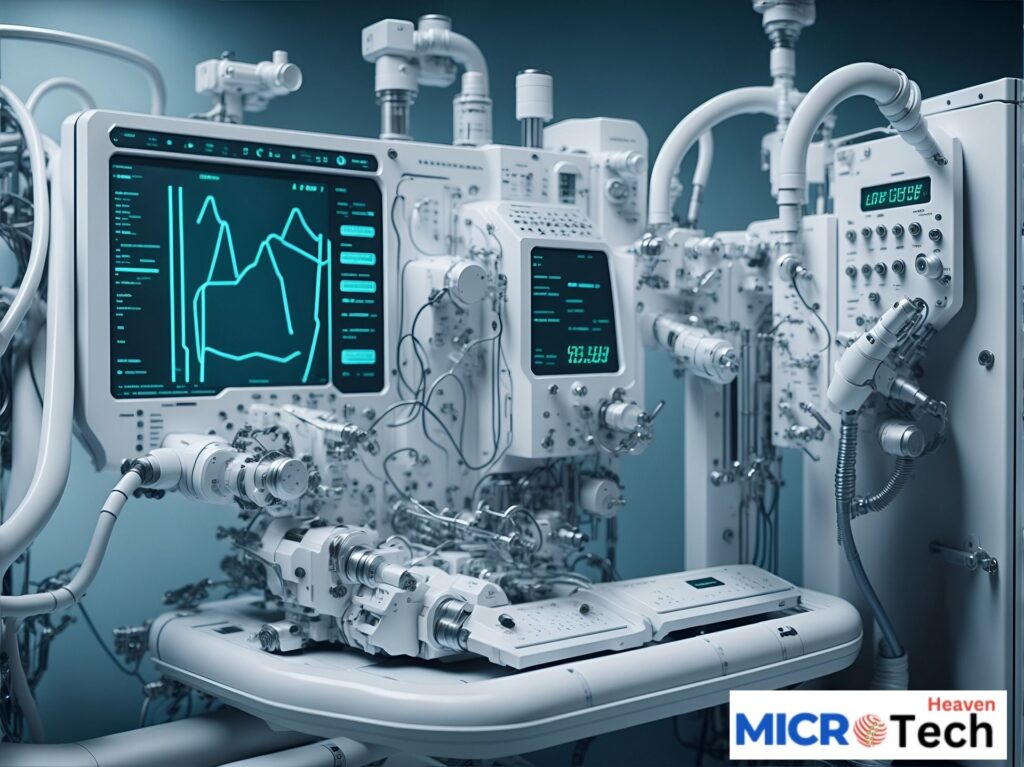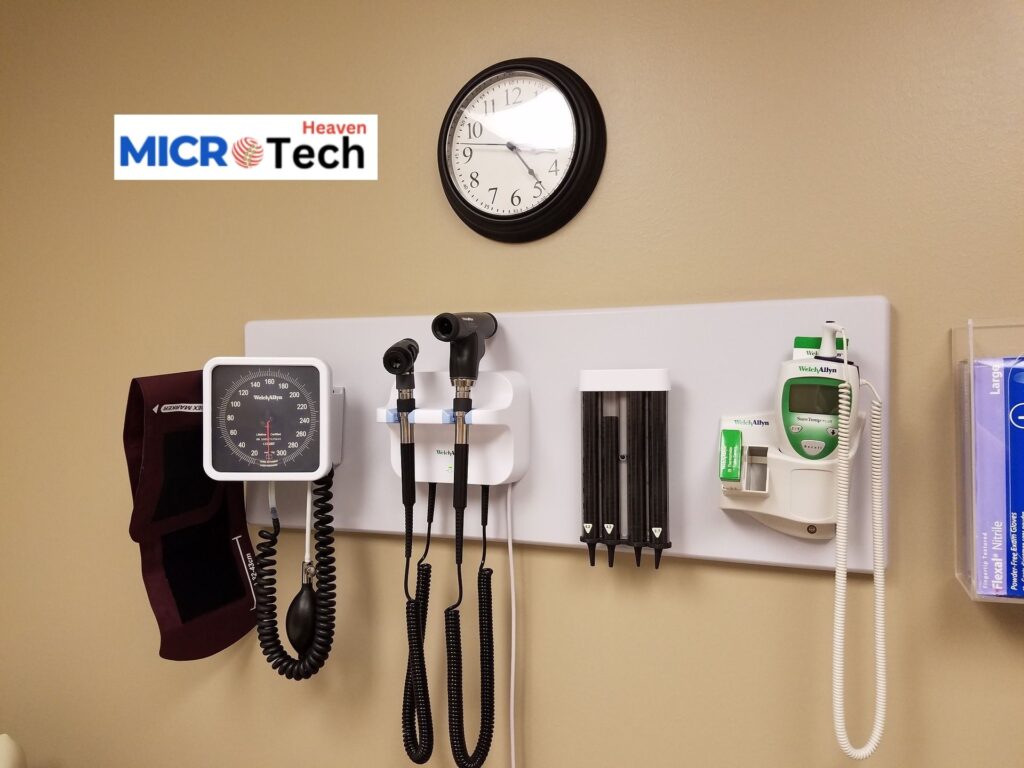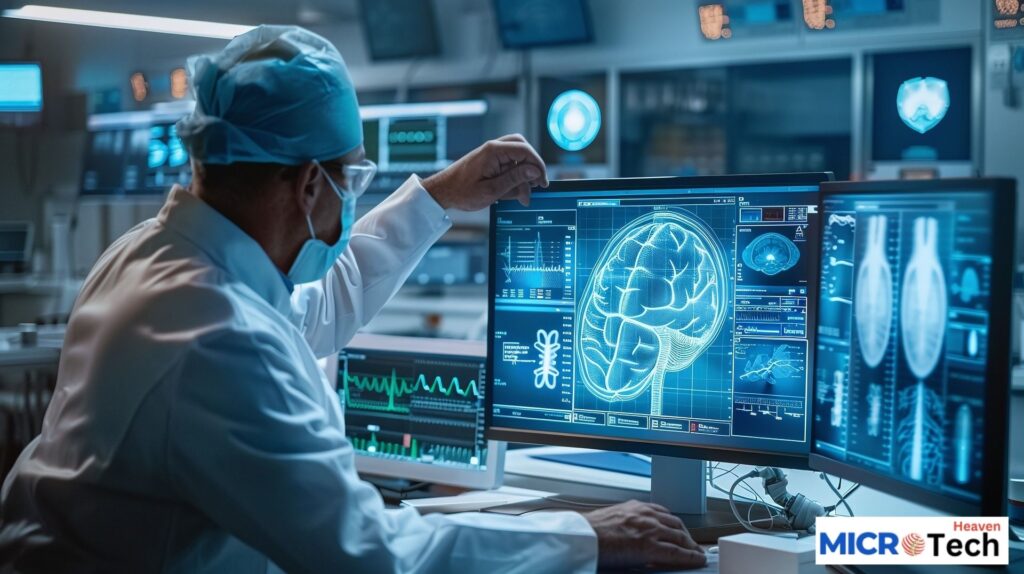The impact of technology on healthcare has been revolutionary, transforming how patients access medical care, how doctors diagnose diseases, and how hospitals manage patient data. From AI healthcare technology to wearable health devices, innovations have enhanced healthcare accessibility, quality, and efficiency. This article explores the future of healthcare technology, highlighting key trends, benefits, and challenges.

AI Healthcare Technology: Redefining Diagnosis and Treatment
One of the most groundbreaking advancements in healthcare is AI healthcare technology. Artificial Intelligence (AI) is revolutionizing how doctors analyze data, diagnose illnesses, and personalize treatment plans. For instance, AI algorithms can analyze thousands of medical images, such as X-rays and MRIs, in seconds, detecting abnormalities that may be missed by the human eye. In addition, AI healthcare technology helps doctors predict disease risks by analyzing genetic data and patient history. Learn more about AI in healthcare and its potential to improve diagnostic accuracy.
Benefits of AI in Healthcare:
Faster Diagnoses: AI speeds up analysis, enabling early detection of diseases like cancer.
Personalized Treatment: AI tailors treatment based on a patient’s unique needs.
Predictive Analytics: AI identifies risk factors to prevent illnesses.

What is the Future of Healthcare Technology?
- The future of healthcare technology
promises even greater advancements, with innovations aimed at making healthcare more accessible, affordable, and patient-centered. - Emerging technologies such as telemedicine, robotics, and 3D printing are already reshaping the industry. Imagine robotic-assisted surgeries offering unmatched precision or 3D-printed implants
customized to a patient’s anatomy. - According to experts, the future of the medical field will integrate AI, virtual reality (VR), and augmented reality (AR) to create immersive learning experiences for doctors and improved treatments for patients.
Explore more about the future of healthcare and its impact on patient care.
Pros and Cons of Wearable Technology in Healthcare
Wearable technology has empowered individuals to monitor their health in real-time. Devices like fitness trackers, smartwatches, and health monitors track heart rate, sleep patterns, physical activity, and more. These devices provide valuable data to healthcare providers, enabling proactive care. For example, a person managing diabetes can use a wearable glucose monitor to track their blood sugar levels throughout the day. However, while the benefits are immense, there are also challenges.
Pros of Wearable Technology:
Real-time Health Monitoring: Tracks vital signs, improving chronic disease management.
Patient Empowerment: Encourages healthier lifestyle choices.
Data Sharing: Enables doctors to monitor patients remotely.
Cons of Wearable Technology:
Privacy Concerns: Health data can be vulnerable to breaches.
Accuracy Issues: Not all devices provide precise readings.
Cost: High-end wearables can be expensive for some users.
Learn more about wearable technology and its role in modern healthcare.
How Has Technology Greatly Supported Doctors and Medical Practitioners?

Technology has become a powerful tool in supporting doctors and healthcare providers. From Electronic Health Records (EHRs) to AI diagnostics, technology has streamlined workflows, improved decision-making, and enhanced patient care. For example, EHRs allow doctors to access patient data instantly, ensuring coordinated care. Robotic-assisted surgeries enable doctors to perform minimally invasive procedures with precision, reducing recovery time for patients. Additionally, tools like telemedicine have improved access to specialists, particularly in remote areas. Discover how technology supports doctors in delivering better care.
Use of IT in the Medical Field: Streamlining Healthcare Operations
The use of IT in the medical field has transformed healthcare operations. Hospitals and clinics now rely on IT systems to manage appointments, store medical records, and communicate with patients.
Key IT Applications in Healthcare:
1. Electronic Health Records (EHRs): Replace paper-based records, improving accuracy and collaboration.
2. Telemedicine Platforms: Enable remote consultations, reducing the need for in-person visits.
3. Health Data Analytics: Analyze large datasets to identify trends and improve treatments. By automating administrative tasks, IT helps hospitals operate efficiently, saving time and reducing errors. Learn more about IT applications in healthcare.
What is the Impact of Technology on Medicine?
The impact of technology on medicine has been profound, enhancing diagnostics, treatment, and patient care. Technologies like AI, robotics, and precision medicine have enabled healthcare providers to deliver targeted treatments with better outcomes. For example, precision medicine uses genetic data to design personalized cancer treatments, while AI tools analyze medical data to identify disease patterns. This has significantly improved diagnostic accuracy and patient recovery rates. Explore more about technology in medicine and its benefits for healthcare.
Impact of Technology on Healthcare Cost and Quality
While technology has improved the quality of healthcare, it has also raised concerns about costs. Advanced technologies like robotic surgery, AI diagnostics, and wearable devices come with significant expenses. However, these innovations also reduce long-term costs by improving efficiency, preventing illnesses, and enabling early diagnoses.
How Technology Balances Cost and Quality:
Early Disease Detection: Reduces expensive treatments by catching illnesses early.
Efficient Workflows: Minimizes administrative costs with automated systems.
Improved Outcomes: Higher-quality care leads to fewer hospital readmissions. By focusing on preventive care and efficiency, technology ultimately delivers better healthcare outcomes while managing costs.
Conclusion: Embracing the Future of Healthcare Technology
The impact of technology on healthcare has been transformative, offering innovative solutions to long-standing challenges. From AI healthcare technology to wearable devices, advancements have improved access, quality, and efficiency in healthcare delivery. While challenges like cost and data privacy remain, the future of healthcare technology holds immense promise. By embracing these innovations, we can build a healthcare system that is more patient-centric, proactive, and efficient. Learn more about the future of healthcare and how technology continues to shape the medical field.
FAQ
- What is the future of healthcare technology?
The future includes AI diagnostics, precision medicine, robotic surgeries, and telemedicine, making healthcare more accessible and effective.
- How has technology greatly supported doctors and medical practitioners?
Technology has streamlined workflows, improved decision-making, and enabled advanced treatments like robotic surgeries and AI-powered diagnostics.
- What are the pros and cons of wearable technology in healthcare?
Pros include real-time health monitoring and patient empowerment, while cons include privacy concerns and potential inaccuracies.
- What is the impact of technology on healthcare cost and quality?
Technology improves healthcare quality by enabling early detection and better treatments but can initially increase costs due to implementation expenses.



